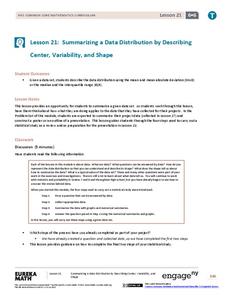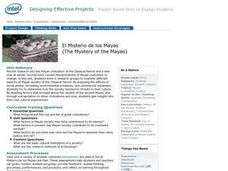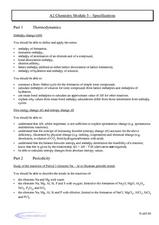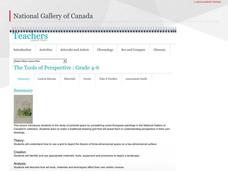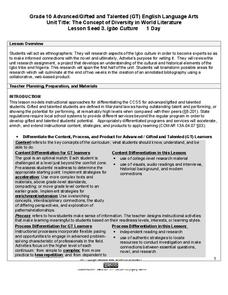Maine Content Literacy Project
Introduction to Short Story Writers Say
There are so many authors of short stories, and your class can have the chance to study quite a few. This seventh lesson in a series of fourteen continues the decision-making process for the final assessment: a short story author study....
Teach Engineering
Skeletal System Overview
It is best to know all about the skeletons in the closet. The third segment in a five-part series focuses on bone structure, development and growth, and functions. Class members connect what they learn to their study of osteoporosis.
Space Awareness
Let's Break the Particles
Build learning by breaking atoms! Young scientists study the way energy changes with a hands-on activity. As they roll steel marbles down a ramp, learners test the hypothesis that kinetic energy does not go away with friction or...
Curated OER
Arkansas Civil War Bandits and Outlaws
Young historians study civilian Arkansas during the Civil War. They look at the many challenges they faced to keep their homes in order while the men were at war. Learners hear stories of bands of outlaws who ravaged the state during...
Curated OER
Salt of the Earth: A Caddo Industry in Arkansas
Middle schoolers explore the history of the Caddo Salt Industry found in Arkansas. Along with learning about how salt deposits formed in Arkansas, learners study the process of salt production and how valuable salt is as a natural...
Curated OER
A Modern Spin on Ancient Greece Using Percy Jackson
Rick Riordan's books provide a wonderful platform for the study of mythology.
EngageNY
Summarizing a Data Distribution by Describing Center, Variability, and Shape
Put those numbers to work by completing a statistical study! Pupils finish the last two steps in a statistical study by summarizing data with displays and numerical summaries. Individuals use the summaries to answer the statistical...
Curated OER
El Misterio del los Mayas (The Mystery of the Mayas)
Students, working in groups, research different aspects of the Mayan society of the classical period. They study the rise and fall of the civilization and present the information in multimedia presentations.
Curated OER
Homer's The Odyssey
Whether or not you are new to using The Odyssey with your classes, this publisher-produced teaching guide deserves a place in your curriculum library. The packet includes background information, chapter by-chapter summaries, study...
TCI
Picking Rusty Gold: Why Do People Buy and Sell Antiques?
Your historical sleuths will work to research the in-depth history of chosen artifacts and will use their research to design a fictional advertisement for an early 20th century item.
Curated OER
Chemistry Module 5 - Specifications
While this resource does not provide problems for chemistry learners to solve, it outlines skills that they should have and concepts that they should grasp. Topics include thermodynamics, periodicity, redox equilibria, transition metals,...
Curated OER
The History of African-American Children: A Guide for Teaching Black History at the Elementary School Level
How do you introduce the topic of slavery to your youngest learners? The Sneetches, by Dr. Suess, is a great introduction to the idea of being different. Read the story to your class, and discuss desegregation in public buildings. This...
Curated OER
Pollination Power
Second graders study and examine the structure of a flower. In this pollination lesson, 2nd graders observe pollinators in the garden and dissect a flower. Students then plant strawberry plants in the garden and observe the process of...
Curated OER
Introduction to Ludwig van Beethoven
"Ode to la Tortilla" and "Ode to Joy"? Sure! Use Gary Soto's poem to introduce learners to the ode format. After examining the descriptive words Soto uses, class members study a poster of Ludwig van Beethoven, suggest words that describe...
National Gallery of Canada
The Tools of Perspective
Make a study of perspective in the real world. Learners examine and discuss works of art that show examples of perspective before trying their own hands at it. Using a grid drawn on transparent paper, class members transfer a view from a...
Maryland Department of Education
The Concept of Diversity in World Literature Lesson 7: Cultural Commentary
As part of their study of Things Fall Apart, class groups develop a multimedia presentation in response to the question, "In what ways does Achebe use literature as a means to express and comment on culture and history?"
Maryland Department of Education
The Concept of Diversity in World Literature Lesson 8: Nonfiction Close Reading
As part of their study of Things Fall Apart, class members conduct a close reading of a section of Chinua Achebe's essay, "An Image of Africa: Racism in Conrad's Heart of Darkness." Jigsaw groups then compare the voice in the essay...
Maryland Department of Education
The Concept of Diversity in World Literature Lesson 3: Igbo Culture
What cultural concepts must readers understand in order to connect to Things Fall Apart? As part of their study of Chinua Achebe’s novel, class members research Nigeria and the Igbo culture to create a collaborative, web-based, annotated...
Maryland Department of Education
The Concept of Diversity in World Literature Lesson 4: Proverbs
"Eneke the bird says since men have learnt to shoot without missing, he has learnt to fly without perching." As part of their study of Things Fall Apart, class members read Paul Hernadi and Francis Steen's essay, "The Tropical Landscapes...
Teach Engineering
Earthquakes Living Lab: Geology and Earthquakes in Japan
Sometimes it seems as if earthquakes hit the same places over and over again. Class members study Japan in order to determine why earthquakes keep happening there. Pairs work together to research and try to determine whether there are...
EngageNY
Ratios II
Pupils continue the study of ratios by creating ratios from a context. The contexts present more than two quantities, and scholars create contexts that match given ratios.
Austin Independent School District
History Mapping
This is a great activity to have on hand to help your young historians summarize major historical events. Learners identify key players and contextual information, major episodes of the event, and any resolutions or lasting impressions.
Center for Civic Education
Martin Luther King Jr. and the Power of Words
It is easy to forget the power that written or spoken word can have in effecting change. Using quotations from such inspirational leaders as Maya Angelou, Mahatma Gandhi, and Martin Luther King Jr., encourage your class members to...
School Improvement in Maryland
Are These Human Right Violations?
Using the Declaration of Human Rights and the United States Constitution as reference tools, class members examine 14 scenarios to decide if the situation represents a violation of human rights, and if these same rights are protected by...








